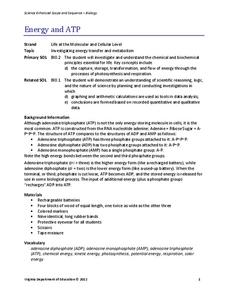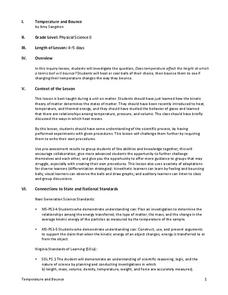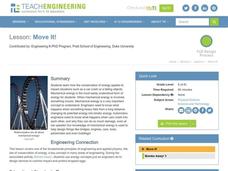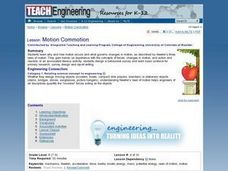Bonneville
Introduction to Energy
Transform the classroom with energy. Pupils learn about different types of energy and practice identifying the types in the first instructional activity of six in a solar versus wind energy unit. The class sees examples of how one type...
NEED Project
Calibrating Thermometers
Engage young scientists in the upper-elementary and middle school grades with this collection of simple experiments. Whether you're teaching about heat transfer, density, or potential energy this resource has a lab for you.
Cornell University
Energy Changes in Chemical Reactions
The heat of solution measures how much thermal energy a dissolving substance consumes or gives off. The experiment demonstrates both endothermic and exothermic reactions. Scholars dissolve several substances, measure the temperature...
Curated OER
Swinging Pendulum
Students engage in an activity which demonstrates how potential energy (PE) can be converted to kinetic energy (KE) and back again. Given a pendulum height, students calculate and predict how fast the pendulum will swing by understanding...
Curated OER
Pendulums
First-time physicists experiment with pendulums in this physics lesson. They vary the weight of the bob, record how long each takes to complete ten period swings, and then calculate the time for one period. They repeat the procedure,...
American Chemical Society
Heat, Temperature, and Conduction
How does heat move from one item to another, even when the items are in different states of matter? Pupils experiment with adding washers to hot water and adding hot washers to room temperature water to observe the heat transfer.
Curated OER
Energy and Work: Transformation Through Engines
Young scholars conduct a webquest on an energy source they chose. In this physics lesson, students design an experiment to determine the factors affecting potential and kinetic energy. They calculate speed and create distance vs. time...
Curated OER
Energy and Work: Transformation through Engines
Learners are introduced to the concept of thermodynamics. In groups, they participate in experiments in which they discover how potential energy converts into kinetic energy. They use the internet to research the components of a...
Curated OER
Kinetic Vs. Potential Energy
Eighth graders listen to a teacher lecture and observe a demonstration of both potential energy and stored energy. After discussing the characteristics and examples of different types of energy, 8th graders make predictions and then...
Virginia Department of Education
Energy and ATP
Take charge of your biology class by using this exciting analogy to relate the ATP process with batteries. Pupils use batteries and rubber bands to simulate the phosphate bonds between molecules in the body. They measure the distance in...
Curated OER
What is Energy?
Youngsters take a look at the foods they eat, and how they provide energy for them to do things. They look at how body uses the food energy to create movement. Pupils also look at toys/devices in the room that need electrical energy...
Virginia Department of Education
The Particle Theory of Matter
Demonstrate the particle theory of matter to high school scientists with an engaging experiment that allows them to visually see the results as substances change from one state to another. The class concludes with a discussion about how...
Curated OER
Momentum and Energy
Students study how to calculate momentum, kinetic, and potential energy. They apply each form of energy to real world situations including demonstrations, watching videos, and designing a Power Point presentation. They investigate in...
STEM for Teachers
Temperature and Bounce
Take part in a fun experiment and hold an impromptu bouncing contest with your class. Young scientists heat and cool balls before bouncing them to determine whether temperature changes affect how they bounce. The set of STEM lesson plans...
Curated OER
Forces and Energy Study Guide
Sixth graders use prior knowledge to create a tri-fold study guide using Microsoft Publisher (if available). They include real world examples that show balanced and unbalanced forces, kinetic and potential energy, and vocabulary. The...
Curated OER
Move It!
Learners observe a demonstration presented by the teacher covering different types of energy. They participate in an experiment where they study numerous physics vocabulary words and visit websites that demonstrate examples of these...
Virginia Department of Education
States of Matter
Scientists have been studying exothermic reactions before they were cool. The lesson begins with a discussion and a demonstration of heat curves. Scholars then determine the heat of fusion of ice and the heat needed to boil water through...
Curated OER
Hot Time in the Classroom
Fourth graders, in groups, examine how temperature is a measure of the average translational kinetic energy.
Curated OER
What is Energy?
In this energy worksheet, 7th graders study the varying types of energy. Students read the 7 types of energy listed and complete the chart giving an example for each.
Curated OER
Science: Einstein's Big Idea
Students explore the various aspects of Einstein's energy equation and discover how energy is transferred from one form to another. In teams, they rotate through seven stations to experience such aspects of energy change through...
Curated OER
Science: Motion Commotion
Students examine Newton's three laws of motion to discover what causes it and how it changes. They conduct motion experiments by building catapults and constructing balloon rockets. Finally, they conduct peer studies correlating...
Chicago Botanic Garden
Albedo, Reflectivity, and Absorption
What is reflectivity, and what does it have to do with the Earth's climate? As reflectivity is measured by albedo, scientists can gather information on Earth's energy balances that relate to global warming or climate change. Budding...
Curated OER
Energy Conservation Games
Students become acquainted with the first law of thermodynamics, which concerns the conservation of energy as it is transformed from one form to another. They identify forms of energy, and devices or processes that transform energy from...
LABScI
Projectiles: Target Practice
Angry Birds prepared them, but now pupils must prove their skills with projectiles! Scholars test different variables to determine which ones impact the distance the projectile flies. The experiment provides connections to kinetic and...

























